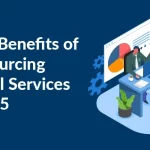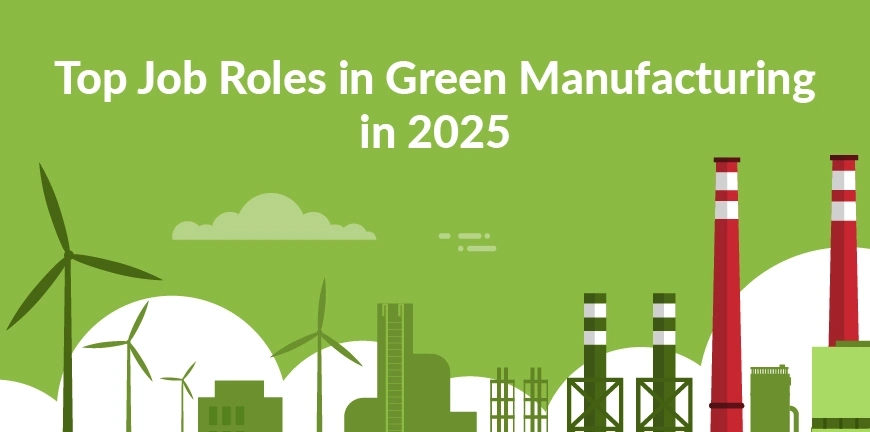
Top 8 Benefits of Outsourcing Payroll Services in 2026
08/01/2025
How to Hire a Front-End Developer in 2026: Complete Hiring Guide
10/01/2025There has been a global shift toward sustainability and decarbonization in recent years, placing green manufacturing at the forefront of industrial transformation. This shift in the sector is expected to generate numerous opportunities for professionals who have the expertise in renewable energy, sustainability principles, and advanced technologies like AI and automation.
2025 will present an enormous number of opportunities to individuals looking to pursue careers in the green energy sector. But before diving into one, it’s essential to know about their significance, skills required, and how they will contribute to a sustainable industrial future.
What are the top job roles in green manufacturing?
1. Sustainability design engineers
Sustainability design engineers will play an important role in making sure that the product development and manufacturing processes are in line with the environmental and social responsibilities. They will be responsible for designing products and systems that can help reduce the environmental impact while meeting performance and quality standards. As a sustainable engineer here are some of the key responsibilities they will have-
- Making eco-friendly product designs
- Conduct lifecycle analysis to determine the environmental impact of the products
- Figure out and integrate renewable, recyclable or biodegradable materials into designing of products
- Collaborate with R&D, manufacturing and supply teams to execute the design
- Ensure that the product designs meet the compliance standards
Technical expertise required – CAD, simulation tools, an idea about sustainability-centred design software
2. Green Supply Chain Analyst
A green supply chain analyst will be responsible for ensuring that the supply chain is sustainable and eco-friendly by focusing on the reducing the environmental impact of sourcing, production, transportation, and distribution. Some of the key responsibilities of a green supply chain analyst are-
- Identifying the areas where the environmental impact is maximum like carbon emissions, energy consumption and waste generation
- Evaluation of logistics networks to reduce fuel consumption by adopting green transportation methods or coming up with better road routes.
- Designing of reverse logistics processes for proper recycling or disposal
- Ensure supply chain operations meet environmental regulations and standards
Technical expertise required- Proficiency in supply chain modelling and data analysis tools such as SAP, Tableau, or Excel.
3. Energy efficiency specialist
As the name suggests, an energy efficiency specialist is responsible for focussing on reduction of energy consumption across industries in manufacturing and operations. Some of the key responsibilities they have are
- Conducting energy audits to identify areas and systems that need improvement like machinery, operations etc
- Implement strategies to make the best use of energy intensive processes like heating and cooling
- Integrate advanced technologies like smart sensors, IoT, and AI for real-time energy monitoring and control.
- Educate staff about practices that can save and conserve energy
- Stay updated on energy policies and adhere to the regulations and certifications
Technical expertise required- Knowledge about energy management systems, energy modelling tools and the right equipment.
4. Carbon footprint auditor
A carbon footprint auditor assesses and manages the carbon emissions of products, processes or organizations. Some of the key responsibilities of a carbon footprint auditor are
- Conducts audits to measure carbon emissions while using tools and software to collect data, for analysis and further reporting.
- Ensure compliance with carbon reporting requirements
- Collaborate with other teams to design strategies for emission reduction and promote recycling practices to minimize waste
- Help obtain necessary certifications or third-party verification schemes
Technical expertise required- Must know carbon accounting methodologies, tools and reporting frameworks.
5. Renewable energy business engineers
Renewable energy business engineers will spearhead the integration of solar, wind, and bioenergy solutions into industrial settings. Some of the key responsibilities they hold are
- assess project feasibility, optimize renewable energy systems, and ensure sustainable energy use in manufacturing.
- Plan, design and execute projects like solar farms, wind turbines etc.
- Create financial models to develop renewable energy initiatives
Technical expertise required- Knowledge of renewable energy systems, grid integration, and energy storage technologies.
6. Project Finance Analyst
One of the key contributors in the green energy sector, project finance analysts evaluate the financial viability of green projects, manage budgets, and secure funding. Their expertise ensures economic sustainability of renewable energy and infrastructure initiatives. Some of their key responsibilities include-
- Evaluate the technical, environmental and regulatory aspects of green projects
- Figure out financial feasibility like ROI and pay periods etc.
- Design finance structures that can minimize costs and risks
- Negotiate contracts, agreements with legal teams
- Raise funds for green energy projects by working with investors, banks etc.
Technical expertise required- Strong proficiency creating financial models, valuation techniques, and using investment analysis tools like Excel.
7. Land Acquisition Manager
They play in important role in green energy sector as they help in identifying and acquiring locations for green projects such as wind and solar farms. They have the responsibility of making sure of adherence to environmental regulations and managing stakeholder collaboration. Some of their key responsibilities include
- They collaborate with engineers and other environmental specialists to assess the site feasibility to install solar, wind or other renewable energy generation projects
- Negotiate with landowners to agree upon lease agreements or others for project development
- Make sure the land acquired is in adherence to zoning laws and environmental regulations and also obtain the required permits for the same.
- Address land disputes, access restrictions and other legal problems.
Technical expertise required- Expertise in land laws, zoning regulations, and environmental compliance specific to renewable energy projects.
8. Power electronics specialist
Power electronics specialists develop systems that regulate energy use in electric motors, renewable energy, and storage solutions. Their focus is on improving energy efficiency and reducing waste in green manufacturing operations. Some of their key responsibilities include-
- Designing power conversion systems like inverters and rectifiers to make the best use of energy conversion from renewable resources
- Ensure proper integration of power electronics into renewable resources like wind, solar systems
- Address issues related to power quality, including harmonic distortion, voltage sags, and frequency variations.
- Regular testing of the electronic systems to ensure their efficiency and reliability
Technical expertise required- Proficiency in designing power electronics systems, including knowledge of inverters, converters, and controllers used in renewable energy.
Wrapping Up
As India progresses toward a more sustainable future, the demand for skilled professionals in sustainability-focused roles is increasing. Additionally, equipping the workforce with the right expertise will be crucial for India’s success in achieving sustainable industrial growth.
Contact Us For Business Enquiry

Amit Saproo
Amit Saproo is the Head of Operations at ALP Consulting with nearly 17 years of experience in Executive Search, RPO, Leadership, and IT & Engineering recruitment. He leads nationwide recruitment programs across Technology, BFSI, and R&D domains, driving strategic hiring solutions for diverse client needs. Amit excels in building and managing high-performance teams that deliver scalable, end-to-end recruitment and consulting services.



